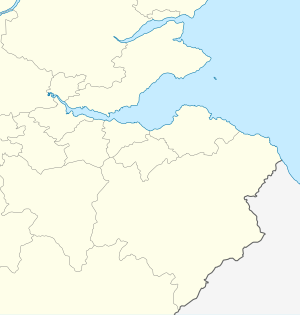| Battle of Dupplin Moor | |||||||
|---|---|---|---|---|---|---|---|
| Part of the Second War of Scottish Independence | |||||||
| |||||||
| Belligerents | |||||||
| Scotland |
Disinherited Scots English supporters | ||||||
| Commanders and leaders | |||||||
| Strength | |||||||
| 15,000 to 40,000 | 1,500 | ||||||
| Casualties and losses | |||||||
| High | 35 killed | ||||||
| Designated | 21 March 2011 | ||||||
| Reference no. | BTL8 | ||||||
The Battle of Dupplin Moor was fought between supporters of King David II of Scotland, the son of King Robert Bruce, and English-backed invaders supporting Edward Balliol, son of King John I of Scotland, on 11 August 1332. It took place a little to the south-west of Perth, Scotland, when a Scottish force commanded by Donald, Earl of Mar, estimated to have been stronger than 15,000 and possibly as many as 40,000 men, attacked a largely English force of 1,500 commanded by Balliol and Henry Beaumont, Earl of Buchan. This was the first major battle of the Second War of Scottish Independence.
The First War of Scottish Independence between England and Scotland ended in 1328 with the Treaty of Northampton, recognising Bruce as King of Scots, but the treaty was widely resented in England. King Edward III of England was happy to cause trouble for his northern neighbour and tacitly supported an attempt to place Balliol on the Scottish throne. Balliol and a small force landed in Fife and marched on Perth, then the Scottish capital. A Scottish army at least ten times stronger occupied a defensive position on the far side of the River Earn. The invaders crossed the river at night via an unguarded ford and took up a strong defensive position.
In the morning the Scots raced to attack the English, disorganising their own formations. Unable to break the line of English men-at-arms, the Scots became trapped in a valley with fresh forces arriving from the rear pressing them forward and giving them no room to manoeuvre, or even to use their weapons. English longbowmen shot into both Scottish flanks. Many Scots died of suffocation or were trampled underfoot. Eventually they broke and the English men-at-arms mounted and pursued the fugitives until nightfall. Perth fell, the remaining Scottish forces dispersed and Balliol was crowned King of Scots. By the end of 1332 he had lost control of most of Scotland, but regained it in 1333 with Edward III's open support. He was deposed again in 1334, restored again in 1335 and finally deposed in 1336, by those loyal to David II.

